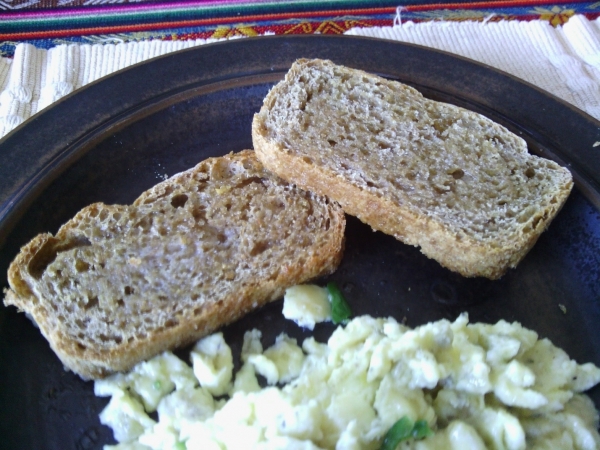WEST BRATTLEBORO — The New Year is a wonderful time to get started - sourdough started, that is.
A tradition in many cultures, as old as baking itself, sourdough starter is the magic that converts flour, water, and salt into chewy, crusty bread.
Starter is the first step in the fermenting process of grains. Fermenting is a fancy way of saying “breaking down,” and breaking down is a layman's way of saying pre-digesting.
Grain is eaten by bacteria. As they digest the grain, the bacteria emit gas and enzymes. These bacteria are digestive ombudsmen, converting a tough, bran-covered starch into a permeable, burnable sugar. When you include the starter in your bread dough, it adds a distinctive flavor and causes it to rise.
Remember the recent bestseller The Immortal Life of Henrietta Lacks? Henrietta's cells reproduce into perpetuity, providing they are continually fed and kept in a suitable habitat. Starters could conceivably live forever, too.
European families smuggled their precious starter - as valuable as jewels - into the New World. It's fascinating to think of some starters being older than our country, older than the Renaissance. I wonder how old is the oldest starter? Maybe someone is baking bread that once fed Cleopatra or Michelangelo? It boggles the mind.
Back in the 1990s, I worked at the Front Porch bakery in Putney. The owner, Dan Foster, used a particular type of starter made out of grape seeds, which yielded a sweet, delicate crust. This type of starter is best suited for gluten-free diets.
Most starters, however, are simply made of flour and water. What's interesting to note is that sourdough bread is often tolerated in special diets, due to the bacteria working its magic on the grains' starch (sugar) and protein (gluten). Sourdough assimilates more readily in tender tummies.
* * *
Making sourdough starter is wicked easy: mix equal amounts of whole-wheat flour and water in a container. That's it!
However, with all good things, there's a bit more to it than that.
Whole wheat flour: the fresher the better. Choose a locally milled grain like Butterworks Farm or gluten-free options from West Meadow Farm Bakery. For more information on locally milled grains, check out “Flour to the People!” in Edible Green Mountains' late fall 2014 edition.
In general, use organic flour from as local a source as possible. At the very least, use whole-wheat flour from our local co-ops. Both the Putney Food Co-op and Brattleboro Food Co-op offer locally milled grains.
Water: Use clean well water. Avoid tap, chlorinated, distilled, and bottled water. If you live downtown, make friends with someone who lives out in the boonies, then go on “water visits” once a month.
Container: Glass or ceramic. Wooden bowls could work, but the bowl might crack. The point is to use a natural-material container to avoid chemical leakage and to keep everything that comes into contact with your starter to be of pure chemical quality. Starter is vulnerable; any bacteria will affect it and likely destroy it.
Attitude: Loving and grateful. Starter is alive and dynamic and, like all living creatures, is sensitive to energy. When tending to your starter, treat it lovingly, like you would any pet or partner.
* * *
My sourdough starter is over 10 years old; I made it when we moved into our house. I like that it's as old as our home.
Sourdough starter makes a great home-warming gift. Place it in a mason jar accompanied with a bag of good whole-wheat flour and a jug of well water. Cool, classy, and cost-efficient!
Speaking of cost-efficiency, making homemade bread cuts down on the budget for this dietary staple. Good-quality loaves run about $6. Homemade bread costs about $1.50 per loaf. Homemade bread takes time, but it pays back in nutrition.
There are so many benefits to bread-baking: great arm exercise; fun kids' activity; and basic life skill-building. Sourdough bread baking revives an ancient artisanal ritual, supporting Slow Living philosophy. Making starter in the new year is a symbolic gesture to welcome new beginnings and healthy resolutions.
It's time to get started! Happy New Year!
Fare well.
